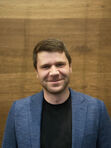Stephen D. Morrison's Blog, page 8
March 19, 2017
Karl Barth on Separating Christians from Non-Christians
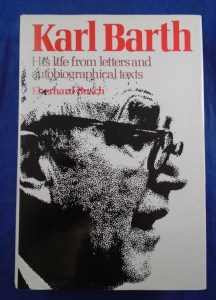 In a moving yet brief portion of Barth’s life from autobiographical texts, compiled and edited by Eberhard Busch, Barth had this to say in response to a question regarding non-Christians attending his lecture on systematic theology:
In a moving yet brief portion of Barth’s life from autobiographical texts, compiled and edited by Eberhard Busch, Barth had this to say in response to a question regarding non-Christians attending his lecture on systematic theology:
“Several times during these weeks I was asked, ‘Aren’t you aware that many people at these lectures are not Christians?’ I always laughed and said, ‘It makes no difference to me.’ It would be quite dreadful if the faith of Christians aimed at separating men and cutting them off from each other. It is in fact the strongest motive for bringing men together and uniting them.‘” (pp. 337-8)
This was during Barth’s guest lectures in Bonn, directly following WWII. These lectures were on “Dogmatics in outline, following the Apostles Creed”, and began on May 17th, 1946. These would later became what I consider to be one of the best introductions to Barth’s theology, the book Dogmatics in Outline.
Here Barth is candid on the central fact that the gospel is not about splitting humanity up into Christian and non-Christian camps, but about uniting all humanity in Jesus Christ. Just as we have been reconciled to God in Jesus Christ, likewise we must be reconciled to our fellow man in Jesus Christ. This, of course, does not removed the distinction there is between a Christian and a non-Christian, but it absolutely removes the division. Both are sinners saved by grace, both are those for whom Christ died, both are the objects of His eternal love and election in Jesus Christ! We should remember this. Whenever we think to separate ourselves from our non-Christian brothers and sisters and neighbors, we have forgotten the very gospel itself!
Like this article? Share it!
March 15, 2017
St. Augustine VS Jürgen Moltmann (On Loving God)
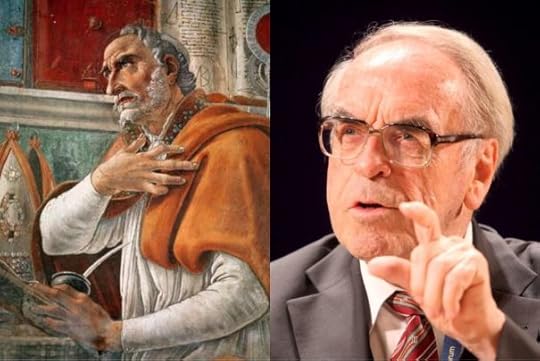 Today we continue “Moltmann-March” with a quote contrasting Moltmann’s understanding of loving God as gladly existing, and Augustine’s understanding of loving God as rejecting existence and hiding in the innermost self. This quote comes from Moltmann’s excellent book The Source of Life: The Holy Spirit and the Theology of Life. For other recommended books by Moltmann, check out last week’s article.
Today we continue “Moltmann-March” with a quote contrasting Moltmann’s understanding of loving God as gladly existing, and Augustine’s understanding of loving God as rejecting existence and hiding in the innermost self. This quote comes from Moltmann’s excellent book The Source of Life: The Holy Spirit and the Theology of Life. For other recommended books by Moltmann, check out last week’s article.
For now, enjoy this fascinating match-up between Jürgen Moltmann and St. Augustine on loving God!
“One evening I read the following passage in Augustine’s Confessions. Augustine says:
“‘But what do I love when I love you? Not the beauty of any body or the rhythm of time in its movement; not the radiance of light, so dear to our eyes; not the sweet melodies in the world of manifold sounds; not the perfume of flowers, ointments and spices; not manna and not honey; not the limbs so delightful to the body’s embrace: it is none of these things that I love when I love my God. And yet when I love my God I do indeed love a light and a sound and perfume and food and embrace—a light and sound and perfume and a food and an embrace in my inward self. There my soul is flooded with a radiance which no space can contain; there a music sounds which time never bears away; there I smell a perfume which no wind disperses; there I taste a food that no surfeit embitters; there is an embrace which no satiety severs. It is this that I love when I love my God.’ (X.6, 8)
“And that night I answered him:
“When I love God I love the beauty of bodies, the rhythm of movements, the shining of eyes, the embraces, the feelings, the scents, the sounds of all this protean creation. When I love you, my God, I want to embrace it all, for I love you with all my senses in the creations of your love. In all the things that encounter me, you are waiting for me.
“For a long time I looked for you within myself and crept into the shell of my soul, shielding myself with an armour of inapproachability. But you were outside—outside myself—and enticed me out of the narrowness of my heart into the broad place of love for life. So I came out of myself and found my soul in my senses, and my own self in others.
“The experience of God deepens the experiences of life. It does not reduce them. For it awakens the unconditional Yes to life. The more I love God, the more gladly I exist. The more immediately and wholly I exist, the more I sense the living God, the inexhaustible source of life and eternal livingness.”
(The Source of Life, p. 87-8 emphasis mine)
Like this article? Share it!
March 7, 2017
Moltmann-March! Reading Jürgen Moltmann: Where to Begin

Cheers, Professor Moltmann!
In my email newsletter I dubbed this March a “Moltmannian-March” in celebration of the theology of Jürgen Moltmann. To kick off the celebration here’s a list of books to check out by or on Moltmann, for either an introduction to his thought, or to study a particular subject. Enjoy!
Best Introductory Books
Jesus Christ for Today’s World — this is my go-to recommendation for anyone wanting a clear and concise introduction to Moltmann. Many of the major themes of Moltmann’s theology can be found here, and they are presented in a very approachable manner.
The Living God and the Fulness of Life — released last year, this is another great introduction to Moltmann, especially to his mature work. It’s a continuation of his early book The Spirit of Life, but contains a great discussion of God’s omnipotence in a manner essential to Moltmann’s thought. I’ve written up a bit on this book here.
In the End—the Beginning — this is a good introduction to Moltmann’s eschatology for those daunted by the difficult Theology of Hope or the thorough The Coming of God. A great resource, and clearly written.
A Broad Place — this is Moltmann’s auto-biography, and an essential book for understanding not only the theology by the theologian himself, his development and life.
The Crucified God — why not begin with this famous book which established Moltmann as a foremost theologian of our time? This was the first book I read by Moltmann, it’s accessible enough for anyone to tackle. Go for it!
Books by Subject
The Trinity: For Moltmann’s work on the Trinity, check out The Trinity and the Kingdom. This is also a fascinating work on the suffering of God. It’s my personal favorite book Moltmann has written, it’s a beautiful study.
Eschatology (last things): I’ve mentioned these already, but for Moltmann’s eschatology check out Theology of Hope and The Coming of God. The latter contains Moltmann’s fullest treatment of eschatology, while the former is his famous thesis that all theology should be eschatologically oriented.
Pneumatology (Holy Spirit): Moltmann’s major work on the Holy Spirit is in The Spirit of Life: A Universal Affirmation. Also check out The Source of Life for a shorter book on similar themes. The Living God and the Fulness of Life, as I’ve already mentioned, is also an important book for Moltmann’s thoughts on the Spirit of God. These books were particularly fascinating to me, as I’m someone who grew up in a charismatic/methodist church.
Christology (Jesus Christ): Moltmann’s dedicated book of Christology is The Way of Jesus Christ. It’s a very fascinating book, which offers a unique perspective on the doctrine of Jesus Christ.
Creation: God in Creation is Moltmann’s doctrine of creation, in which he presents his panentheistic vision of the world God made. A fascinating book. I’ve written some about this idea here.
Ecclesiology (the church): Though I haven’t gotten around to reading it yet, The Church in the Power of the Spirit contains Moltmann’s ecclesiology, his doctrine of the church.
Notable Mentions
Here are a few more notable books that I’ve read and enjoyed by Moltmann, but which don’t necessarily fit into either of the above categories.
God for Secular Society. I shared a great quote from this book here.
The Passion for Life: A Messianic Lifestyle.
Jürgen Moltmann: Collected Readings. A “greatest hits” sort of book.
Experiences in Theology: Ways and Forms of Christian Theology. This is one I’ve had on my shelf for way too long without reading it. But it’s another great one to check out.
Secondary Literature
These are books by others writing about Moltmann. I haven’t spent much time reading secondary literature on Moltmann, but there are a few notable books worth checking out to explore Moltmann’s thought. Though I’d always recommend reading Moltmann and forming your own opinion of him firsthand before ever reading opinions from someone else.
The Annihilation of Hell by Nicholas Ansell. This is an excellent study on Moltmann’s (hopeful) universalism. I’ve written several article on this book. Here’s my review and another post exploring Moltmann’s “Certain” hope. I highly recommend this book, so much so that I named it among my 12 favorite books for 2016. Perfect for anyone interested in Universalism and Moltmann.
Richard Bauckham is often considered to be one of the leading scholars of Moltmann, and his two books are well worth checking out: The Theology of Jürgen Moltmann and God Will Be All in All. The latter deals specifically with Eschatology, and includes several chapters by Moltmann alongside Miroslav Volf and Trevor Hart.
And would you allow me a little shameless self-promotion in closing? I’ve written a book on Moltmann that I think is worth checking out. It’s called Where Was God? In this book you’ll read a fictional conversation between four friends discussing in the theodicy question. The purpose was to contrast Moltmann’s answer to God and suffering with three other answers common to theology and philosophy. Best of all this book is yours free when you sign up for my Readers’ Group. But you can also get a physical copy through Amazon. Okay, self promotion over. Now go and read some Moltmann!
Happy March, and happy reading!
Like this article? Share it!
February 2, 2017
Robert Jenson’s Alpha and Omega: a Review
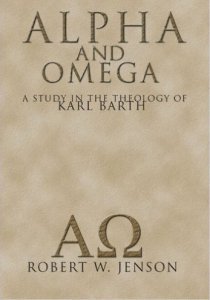 Book: Alpha and Omega: A Study in the Theology of Karl Barth by Robert W. Jenson (Amazon link)
Book: Alpha and Omega: A Study in the Theology of Karl Barth by Robert W. Jenson (Amazon link)
Publisher: Wipf and Stock Publishers, 2002 (Publisher link)
Robert W. Jenson’s book, Alpha and Omega, is an excellently clear, and precise study in the theology of Karl Barth. Jenson asks how it is that the historical event of Jesus’ life might be the decisive reality of our present life, calling this question “the chief problem of modern theology.” (13) Jenson holds Barth’s theology up as a “grandiose and pioneering answer to this challenge [of modern theology].” (16)
With clarity and precision, Jenson examines some of the most difficult aspects of Barth’s thought, including Barth’s doctrine of nothingness, of creation, of election, of salvation, of history, of the incarnation, and of God. The overarching question behind these inquiries is the relationship between Jesus’ historical existence and our present lives, but along the way I found myself attending a masterclass in Barth’s doctrine of election, creation, and providence. I can’t recall reading anything nearly as erudite in secondary literature as Jenson’s presentation.
The three specific questions that Jenson asks of Barth’s theology are as follows. First, “To what end does God rule human history, and what is the course of the history of salvation?” Second, “In what sense does God have a history, and what is the relation between this history and ours? That is how does God guide human history?” Third, “What is the reality to which talk in the Church bears witness?” (17-8)
Of God’s plan for history and the mode of God’s rule in history, Jenson notes that these questions are, for Barth, never asked separately. For Barth, “The coming of Christ to sinners is absolutely determined from all eternity and is the purpose of all that happens.” And furthermore, “Christ’s life, as a movement of God’s eternal will, is itself the basis of its appearance in time.” (113) These for Barth are one of the same proposition, according to Jenson.
In other words, Jenson shows that for Barth, God’s plan for history and His rule in history are one and the same: the life of Jesus Christ. This event is the event of all history and existence, the plan God determined before creation. Jesus’ life is then, for Barth, the central event of all history and of creation. This is the core of Barth’s doctrine of election, that God determined Himself to be God for us in Jesus Christ, to be the God of sinners, to reconcile us to Himself.
The brilliance of this position is shown in how sharply it contrasts with other common presentations. Often the incarnation and salvation of Christ is portrayed as the reaction of God to human sin, placing God in a kind of “hail Mary” position in the face of evil. But Barth reverses the order. If Jesus Christ’s life is the epitome of all history, than this event precedes even the creation of the cosmos. The choice to reconcile human beings to Himself, to become man in Jesus Christ, is an eternal choice in the Triune life of God. Salvation wasn’t an afterthought, God’s coming to us in Jesus Christ was the basis for His act of creation. The difficulties in this position are apparent, but Jenson navigates them masterfully and with clarity.
To the final question, of the reality to which the church bears witness, Jenson turns to Barth’s inclusive Christology. Jenson writes of this reality: “We are what we are in Him. Our existence is ‘virtually accomplished’ in His. In that He has kept the covenant, we have kept the covenant. In that He has obeyed God, we have obeyed God. Our existence is enclosed in His from all eternity. … This history, the history of the man Jesus with God, is our real history.” (132-3)
This inclusive Christology is the reality the church proclaims. The reality of Jesus Christ, who is our obedience, our relationship with God—who is the covenant with God and all humanity—is the proclamation of the church. We proclaim: Look to Christ, here is your history, the basis for your existence as a human, this man with God is all mankind with God! “Our history is participation in Christ’s history.” (136) “Jesus Christ as God and man is the one great history of the eternal covenant between God and man[kind].” (139)
To conclude the book Jenson gives a helpful summary of Barth’s doctrine of election, followed by some final reflections on Barth’s theology. Jenson outlines many areas where he agrees with Barth, but he also offers some insightful criticisms.
Summary:
This book was surprisingly easy to read, written with a clarity often absent from many studies of Barth’s theology. The precision of this study will be of tremendous value to any student of Barth’s thought. Jenson doesn’t dance around the difficult questions, but masterfully navigates through its many challenges. Instead of walking away confused by complex jargon and paradoxical images, I left this book with a better, clearer understanding of Barth’s thought. An excellent book, one I highly recommend.
My thanks to Wipf and Stock Publishers for a digital copy of this book for review. I was under no obligation to offer a positive review, and have presented my honest reflection on this work.
Like this article? Share it!
December 29, 2016
The 12 Best Books I Read in 2016
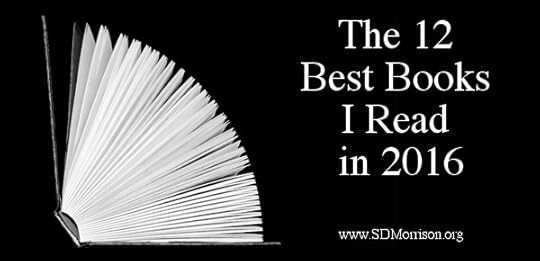 It’s been a great year for reading. My goal this year was to read eighty books, and, to my surprise, I reached that goal in June. I’ve since far surpassed my goal and have read a total of 124 books!
It’s been a great year for reading. My goal this year was to read eighty books, and, to my surprise, I reached that goal in June. I’ve since far surpassed my goal and have read a total of 124 books!
I wanted to list here the books that had the biggest impact on me in 2016 (listed in no particular order). Enjoy!
All is Grace by Brennan Manning [LINK]
This book was deeply moving, and when I finished it I couldn’t hold back the tears in my eyes. Brennan Manning’s story of grace is powerful and immensely inspiring. I hope to revisit this book again soon. My favorite quote:
“My message, unchanged for more than fifty years, is this: God loves you unconditionally, as you are and not as you should be, because nobody is as they should be. It is the message of grace…A grace that pays the eager beaver who works all day long the same wages as the grinning drunk who shows up at ten till five…A grace that hikes up the robe and runs breakneck toward the prodigal reeking of sin and wraps him up and decides to throw a party no ifs, ands, or buts…This grace is indiscriminate compassion. It works without asking anything of us…Grace is sufficient even though we huff and puff with all our might to try to find something or someone it cannot cover. Grace is enough…Jesus is enough.”
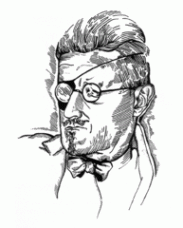 Finnegans Wake (Abridged)
by James Joyce [LINK]
Finnegans Wake (Abridged)
by James Joyce [LINK]James Joyce writes with color and flair, with courage and creativity. He is my favorite fiction writer, with Samuel Beckett being a close second. Finnegans Wake is Joyce’s final book, and it is his most difficult yet most brilliant. Joyce, having exhausted the english language with Ulysses, forged a new language for this book, displaying his mastery of many languages including German, French, Italian, and Latin. Beckett once said this book isn’t written at all. It transcends the novel entirely.
It’s a work of art. I listened to the excellent audio recording by Jim Norton a few times while I read this version. I plan to read the full text in 2017. Here’s a quote from the Anna Livia Plurabelle section:
“Well, you know or don’t you kennet or haven’t I told you every telling has a taling and that’s the he and the she of it. Look, look, the dusk is growing! My branches lofty are taking root. And my cold cher’s gone ashley. Fieluhr? Filou! What age is at? It saon is late. ‘Tis endless now senne eye or erewone last saw Waterhouse’s clogh. They took it asunder, I hurd thum sigh. When will they reassemble it? O, my back, my back, my bach! I’d want to go to Aches-les-Pains. Pingpong! There’s the Belle for Sexaloitez! And Concepta de Send-us-pray! Pang! Wring out the clothes! Wring in the dew! Godavari, vert the showers! And grant thaya grace! Aman.”
(Listen to Joyce read this section here.)
The Annihilation of Hell by Nicholas Ansell [LINK]
I received this book for free in exchange for my review (which you can read here). However, I enjoyed this book so immensely that it is easily one of my favorites this year. It helped me understand the theology of Jürgen Moltmann and appreciate his genius better. I highly recommend it to anyone interested in Moltmann or in universalism generally. Here’s a great quote:
“A universalism of hope, I was thereby suggesting, is neither a dogma nor a ‘nice idea’. Those who, in looking forward to God’s final victory over evil, find themselves looking forward in hope and confidence to a ‘universal’ salvation are convinced of something that others cannot be convinced of unless—or until—they come to share in that hope. In my view, a conviction of this kind, which is pre-theological and pre- doctrinal in character, is legitimate—at least in principle—even if those who hold to it cannot justify it theologically. Moltmann himself captures this pre-theoretical confidence well when he describes his own position as ‘a universalism of hope which is not a doctrine . . . but is a presupposition.’ This is a hope I share and a ‘universalism’ I accept.”
God’s Being in Reconciliation by Adam Johnson [LINK]
This is an excellent study on Karl Barth’s doctrine of atonement. This book has been worth its weight in gold for me while writing my own book on Barth, which is still forthcoming. Johnson argues that Barth’s doctrine of God necessitates a new way for understanding the atonement—not as a one-theory doctrine, but as a feast with multiple interpretations. It is one of the best books I’ve read on Barth. Here’s a great quote:
“A marked lack of energy and excitement overshadows the whole, where a sense of freshness and vigor ought to teem forth resulting from the awareness of these new frameworks for interpreting the work of Christ, the necessity with which we must engage them, and the promise of the definite insights we stand to gain. Adapting an earlier statement of Barth’s, we must ‘magnify the plenitude of the divine being [in reconciliation] by not lingering unduly over any one [standpoint of the atonement] or letting it become the final word or the guiding principle, but by proceeding from one to another, from the second to the third. As we do so, we realize that even if we make a provisional halt at the third, this does not mean that we have spoken the last word’ (CD II/1, 407).”
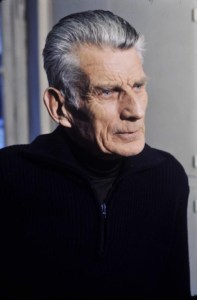 Stirrings Still by Samuel Beckett [LINK]
Stirrings Still by Samuel Beckett [LINK]This is Beckett’s final work of prose, and it is one of my favorites. It’s a very short book, and I have read it several times through. It is a perfect piece of meditative, minimalist prose, yet it is at once pregnant with meaning and emotion. I first savored this book while enjoying a birthday dram of Laphroaig for my 24th. It was a melancholy and enchanting moment. Here’s a taste:
“Such and much more such the hubbub in his mind so-called till nothing left from deep within but only ever fainter oh to end. No matter how no matter where. Time and grief and self so-called. Oh all to end.”
Molloy, Malone Dies, and The Unnamable by Samuel Beckett [LINK]
I read this trilogy in January this year, and I read part of it again last month. This is often considered Beckett’s best work, and it’s certainly his most important contribution to the novel. To this I would agree. It’s a fantastic work of fiction for tired of fiction. There’s a lot I could say about the brilliance of what Beckett accomplishes in these three books, but I hope you take my recommendation and read them for yourself. These books are an experience, like Joyce’s Finnegans Wake, more so than they are a book you read and forget. Here’s a sample:
“you must go on, perhaps it’s done already, perhaps they have said me already, perhaps they have carried me to the threshold of my story, before the door that opens on my story, that would surprise me, if it opens, it will be I, it will be the silence, where I am, I don’t know, I’ll never know, in the silence you don’t know, you must go on, I can’t go on, I’ll go on.” (The Unnamable)
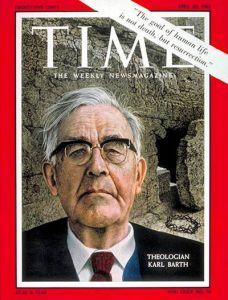 How to Read Karl Barth
by George Hunsinger [LINK]
How to Read Karl Barth
by George Hunsinger [LINK]This book, along with T.F. Torrance’s Karl Barth An Introduction to His Early Theology, were both excellent companions to reading Barth’s CD II/1. But Hunsinger’s book stands out as a brilliant and extremely helpful exploration of the way Barth thinks more than just what he says. If you only read one book on the theology of Karl Barth, read this one.
Church Dogmatics volume II/1 by Karl Barth [LINK]
T.F. Torrance called this volume Barth’s most significant, and after reading it this year I have to agree. Here you’ll find the core ideas behind Barth’s theology: his rejection of natural theology, his dedication to the Word of God, and his insistence upon the fact that God alone reveals Himself. I tweeted and posted hundreds of quotes from this book while I read it, the best of which you can read here.
Water to Wine by Brian Zahnd [LINK]
Reading Brian Zahnd’s story, which was both a theological and spiritual journey, was most of all a comforting experience. His story parallels much of my own journey, and I often related to his rediscovery of the good news and his quest for the heart of the Christian faith. This book is memorable because of how well it was written and how encouraging it is to know I am not alone on the journey. Here’s a quote:
“I had lost my appetite for the mass-produced soda-like Christianity of North America. I wanted vintage wine from old vines. I don’t know exactly how I knew this, but I knew it.”
Re-reading Dubliners and Ulysses by James Joyce [LINK]
I read Joyce’s Dubliners with a book club this year. We met every month to slow digest and discuss his masterful short stories. I also re-read Ulysses during my trip to Ireland for Bloomsday. Both re-reads made me appreciate Joyce more than before. Last year I named Ulysses my favorite fiction book, and this year it again made a significant impact on me. Here’s the first few lines from Ulysses:
“Stately, plump Buck Mulligan came from the stairhead, bearing a bowl of lather on which a mirror and a razor lay crossed. A yellow dressinggown, ungirdled, was sustained gently behind him on the mild morning air. He held the bowl aloft and intoned:
—Introibo ad altare Dei.
Halted, he peered down the dark winding stairs and called out coarsely:
—Come up, Kinch! Come up, you fearful jesuit!”
(Fun fact: this last line is the title of my morning alarm!)
Preaching Christ Today by Thomas F. Torrance [LINK]
This book was the inspiration behind my own attempt to preach Christ, Welcome Home: The Good News of Jesus. Thomas Torrance continually inspires me to be more fixated on the incarnation and death of Jesus Christ as the good news for all people, as the announcement worthy of joy and celebration. Here’s a quote:
“If I did not believe in the cross, I could not believe in God. The cross means that, while there is no explanation of evil, God Himself has come into the midst of it in order to take it upon Himself, to triumph over it and deliver us from it.”
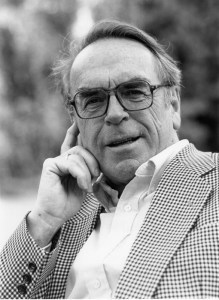 The Living God and the Fulness of Life by Jürgen Moltmann [LINK]
The Living God and the Fulness of Life by Jürgen Moltmann [LINK]And finally, how could I end this reflection without mentioning Moltmann’s new book on the Holy Spirit and the fullness life lived in the Source of all Life. This book inspired me to embrace my humanity and enjoy the simple things, the mundane and the “boring” things, because in these the Spirit of Life is with us and there for us. Here’s a memorable quote:
“Joy is the meaning of human life. Human beings were created in order to have joy in God. They are born in order to have joy in life. This means that the frequent questions—What am I here for? Am I of any use? Can I make myself of any use?—lose their point. There is no purpose and no utilitarian goal for which human life is required. There are no ethical goals or ideal aims with which human life has to justify itself. Life itself is good. Existence is beautiful and to be here is glorious. We live in order to live. …The ‘meaning’ of life cannot be found outside life but in life itself. Life must not be missed as if it were a means to an end.”
Conclusions
Happy New Year, and may you read many great books in 2017!
What were the books you read this year which had the greatest impact on you? Let me know in a comment.
Like this article? Share it!
December 23, 2016
The Sin of Busyness
I read a insightful article by the Washington Post, comparing American and European (specifically Italian) views of busyness. For the American, busyness is a sign of prestige, proof that you are valuable to a company you work for, or society in general.
As an American this rings true. I’ve started working full time a little over a month ago, and on my days off I constantly engage in the battle for productivity. I often lose, and feel discouraged because of it. I have my to-do list. I need to edit a book, write a blog, read more, pray more, and plan better. But I end up overwhelmed and resign to watching Kubrick’s classic “2001: A Space Odyssey” instead.
This article contrasted the American work ethic with the European. The European worker valued the work produced over the time it took to produce it, whereas the American worker believed the opposite, often valuing busyness over the end result itself.
Additionally, our European counterparts valued rest and play and the enjoyment of life far, far more than we do as Americans. In an American society these things are luxuries we set aside at most an hour or two a week for. Yet for the European worker, these are the essentials.
The American work week is said to be 40 hours. But in reality it’s far longer when you include unpaid mealtimes (+5 hours) and commuting to and from work (+5 to +10 hours). And that’s just the minimum hours often required. Most salary workers in mid to upper level positions clock in far more hours of work both in and outside the office. Add it all up and the American is overworked, stressed out, and addicted to busyness.
In Sweden this year, many companies moved to a six hour work day. This was in part because of various studies which have shown how, on average, the same amount of work will get done in six hours as in eight. When we work more, we become less focus and sharp and spend more time wasting time. Six hours keeps us sharp and focused enough to achieve the same in less time.
But why do we continue to exhaust ourselves with an outdated system? The eight hour work day started during the industrial revolution, when workers were primarily labor workers. But with the desk job being the standard of today, this system no longer feels necessary to achieve the desired result of a productive worker.
So why do so many of us continue down this path? It seems to me for an obvious reason.
Americans are addicted to busyness.
It’ll be Christmas Day in a two days time, and as I’m writing this I’m sitting in a restaurant nearby a large, crowded shopping mall. The world from here looks frantic, hurried, and stressed.
It’s important during this Christmas season to become aware of our addiction. We love being busy, filling our days to the brim with tasks and chores and work. But we often forget the important things along the way. We forget rest, play, and creativity; we forget the slow life. We forget to just be, and to be okay with just being. We don’t need to fill the void of insecurity with busyness. We need to rest in the security of contentment—especially in a world constantly selling discontent and need. But you don’t have to listen to it. You won’t be fulfilled when you _______ or _______, when you buy that ______ or achieve that ______.
You’ll be fulfilled when you realize that you alone chose fulfillment.
Contentment is a choice you make. It’s the choice to simply be okay, where you are, as you are, with all your imperfections and weaknesses—to be human.
I call our addiction to busyness sin because one aspect of sin is our attempt to become god. (The garden of eden story is a perfect example.) We imagine that we are supposed to become omnipresent and omnipotent, always knowing and doing all the right things that only god can really do. We imagine we are in control of our lives, that we are our own lords and masters.
But we aren’t and we never will be god.
Sin is our attempt to become god, to become our own judge and jury, our own king, our own savior.
But Christmas is the splendid announcement that God in Jesus Christ became a human being!
This changes everything. God showed us what humanity is for. All our attempts at becoming superhumans with superpowers are shattered in God’s becoming a crying, helpless baby in Bethlehem.
This is how God saves the world. Not with busyness, not with sales and shopping. God becomes an imperfect, frail, weak, ordinary human being just like you and me. He comes to us as one of us who suffers and fears and dies in our humanity to save our humanity from itself—to save us from attempting to be god. He displaces us in our attempt by taking our place, showing us what God is really like and how unworthy we are of ever being god.
Jesus Christ becomes a human being so that dehumanized human beings might become human once again!
Embrace your humanity!
All the frailty and weakness and imperfection of your existence was celebrated by God in Christ becoming a man. Be human, not superhuman. Give up busyness. Rest in who you are, because, as Brennan Manning says so eloquently, “God loves you unconditionally, as you are and not as you should be, because
nobody is as they should be.”
This is the message of grace, and this is the message of Christmas.
Embrace your humanity, give up trying to be omnipotent and omnipresent with your busyness.
Merry Christmas!
During Advent I’ll be sharing many of my favorite books and quotes on the incarnation. Read my Advent book recommendations here, and read more inspiring Christmas quotes and reflections here.
Like this article? Share it!
December 14, 2016
The Strange and Poor Kingdom of God
God’s kingdom is not like the kingdoms of this world. Jesus made that clear throughout His ministry, most notably in trial before Pilate. His kingdom is in the world, but it is strange and poor, weak and needy, frankly, it is a failed kingdom—in the eyes of the world. That’s because it’s not of this world. Compare the kingdom of God with the great kingdoms of human history and it will always seem like a foolish, powerless kingdom.
Karl Barth writes that the kingdom of God is “from the human point of view an insignificant kingdom, a kingdom hidden like the leaven in three measures of meal (Mt. 13:33), like the treasure in the field (Mt. 13:44), like the grain of mustard-seed which is smaller than all other seeds (Mt. 13:32).” 1 Barth goes on to say that this kingdom cannot be seen from observation, nor can it be proclaimed directly or historically. As such God’s kingdom is deeply concealed in the world, a hidden kingdom.
Jesus Christ came to us in weakness, lowliness, and defeat; and the Christian faith believe that to be God’s power, glory, and victory. As Barth writes, “His power is present to men in the form of weakness, His glory in that of lowliness, His victory in that of defeat.” 2
The incarnation is a potent reminder that God’s kingdom works differently than we expect it to in our human vision of an all powerful God and an all powerful kingdom. God’s kingdom contradicts and redefines all our notions of strength and victory. God’s kingdom is not how we might run the world if we had the chance. And yet, God’s kingdom is the good news our world desperately needs to hear.
This is how God saves the world: not with right handed displays of strength, but with left handed acts of vulnerability, weakness, and defeat; by becoming a frail and insignificant baby, born under the suspicion of infidelity; by suffering a horrendous death on the cross. This was God’s perfect plan for salvation.
God overcomes by giving Himself to being overcome. God redeems by lowering Himself to our unredeemed state. Because, as Gregory the Theologian reminds us, “The unassumed is the unredeemed.”
Oh the mystery and the majesty of Christmas!
May you remember this Christmas season to be weak, to be poor and strange, to be a friend of sinners, to take solidarity with outsiders—because such is the kingdom of God!
During Advent I’ll be sharing many of my favorite books and quotes on the incarnation. Read my Advent book recommendations here, and read more inspiring Christmas quotes and reflections here.
Like this article? Share it!
Notes:
CD IV/2, 167 ↩Ibid. ↩December 5, 2016
Thank God Jesus isn’t Santa Claus!
Episcopal priest Robert Farrar Capon writes with brilliant precision on the good news of why Jesus Christ is nothing like Santa Claus:
The words of that dreadful Christmas song sum up perfectly the only kind of messianic behavior the human race, in it’s self-destructive folly, is prepared to accept: ‘He’s making a list, he’s checking it twice; he’s going to find out whose naughty and nice’ – and so on into the dark night of all the tests this naughty world can never pass. For my money, what Jesus senses clearly and for the first time in the coin in the fishes mouth is that He is not, thank God, Santa Clause. He will come to the world’s sins with no list to check, no test to grade, no debts to collect, no scores to settle. He will wipe away the handwriting that was against us and nail it to His cross. (Col. 2:14) He will save, not some minuscule coterie of good little boys and girls with religious money in their piggy banks, but all the stone-broke, deadbeat, overextended children of this world whom He, as the son of man — the Holy Child of God, the ultimate Big Kid, if you please – will set free in the liberation of His death.
And when He senses that… well, it is simply to laugh. He racks a “gone fishing” sign over the sweatshop of religion, and for all the debts of all sinners who ever lived, He provides exact change for free. How nice it would be if the church could only remember to keep itself in on the joke. 1
The only kind of savior we can imagine for ourselves in our twisted self-deception is a Santa Claus savior, a savior who makes a list of all the good and bad and who rewards and punishes them accordingly. But thank God for the incarnation: God’s gracious message that He’s given up the list keeping, religion game for good. God’s grace is not conditional on your behavior, it’s freely given without restriction. God is not a lawman, hell-bent on keeping you in line before He extends grace. For God there is no before grace, there is only after grace!
As we celebrate the advent season it’s important to remember this simple point. God’s grace is nothing like the legalism and list keeping of Santa Claus. God’s grace is free and unconditional, without strings and without a prerequisite “goodness” we keep on our own. God’s grace is free grace, it is God’s gift of Himself to us in the birth of Jesus Christ. When God sought to save the world He gave us the greatest benefit of all: Himself. God so loved the world that He gave. That’s the joy of Christmas, that God gave Himself to mankind, that He came for us and for our salvation.
He’s not making a list, He’s not checking it twice, His free grace doesn’t care if you’ve been naughty or nice!
Thank God Jesus isn’t Santa Claus!
During Advent I’ll be sharing many of my favorite books and quotes on the incarnation. Read my Advent book recommendations here, and read more inspiring Christmas quotes and reflections here.
Like this article? Share it!
Notes:
Kingdom, Grace, Judgement , p 178 ↩November 30, 2016
The Gospel According to Thomas F. Torrance
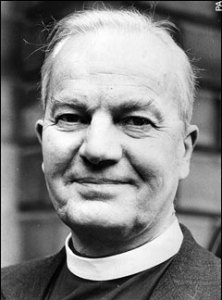 Advent began this past Sunday, November the 27th, and it makes the celebration of Christ’s incarnation, the arrival of the God who loved the world so much that He gave Himself to us by becoming a man in Jesus Christ. In the spirit of advent and in the joy of the gospel here’s a quote from Thomas F. Torrance on what the gospel means:
Advent began this past Sunday, November the 27th, and it makes the celebration of Christ’s incarnation, the arrival of the God who loved the world so much that He gave Himself to us by becoming a man in Jesus Christ. In the spirit of advent and in the joy of the gospel here’s a quote from Thomas F. Torrance on what the gospel means:
“We preach and teach the Gospel evangelically, then, in such a way as this: God loves you so utterly and completely that he has given himself for you in Jesus Christ his beloved Son, and has thereby pledged his very being as God for your salvation. In Jesus Christ God has actualized his unconditional love for you in your human nature in such a once for all way, that he cannot go back upon it without undoing the Incarnation and the Cross and thereby denying himself. Jesus Christ died for you precisely because you are sinful and utterly unworthy of him, and has thereby already made you his own before and apart from your ever believing in him. He has bound you to himself by his love in a way that he will never let you go, for even if you refuse him and damn yourself in hell his love will never cease. Therefore, repent and believe in Jesus Christ as your Lord and Savior. From beginning to end what Jesus Christ has done for you he has done not only as God but as man. He has acted in your place in the whole range of your human life and activity, including your personal decisions, and your responses to God’s love, and even your acts of faith. He has believed for you, fulfilled your human response to God, even made your personal decision for you, so that he acknowledges you before God as one who has already responded to God in Him, who has already believed in God through him, and whose personal decision is already implicated in Christ’s self-offering to the Father, in all of which he has been fully and completely accepted by the Father, so that in Jesus Christ you are already accepted by him. Therefore, renounce yourself, take up your cross and follow Jesus as your Lord and Saviour.
“To preach the Gospel of the unconditional grace of God in that unconditional way is to set before people the astonishingly good news of what God has freely provided for us in the vicarious humanity of Jesus. To repent and believe in Jesus Christ and commit myself to him on that basis means that I do not need to look over my shoulder all the time to see whether I have really given myself personally to him, whether I really believer and trust him, whether my faith is at all adequate, for in faith it is not upon my faith, my believing or my personal commitment that I rely, but solely upon what Jesus Christ has done for me, in my place and on my behalf, and what he is and always will be as he stands in for me before the face of the Father. That means that I am completely liberated from all ulterior motives in believing or following Jesus Christ, for on the ground of his vicarious human response for me, I am free for spontaneous joyful response and worship and service as I could not otherwise be.” 1
This comes from Torrance’s brilliant and short book The Mediation of Christ. In our last article I recommended this book, alongside several others, as great books you can read during Advent this year. You can find the full list of books here. I will continue to post quotes from these books and share Incarnation/Advent related thoughts until Christmas, so stay tuned!
Like this article? Share it!
Notes:
The Mediation of Christ, Thomas F. Torrance 1992, pp 94-5 ↩Great Books to Read for Advent
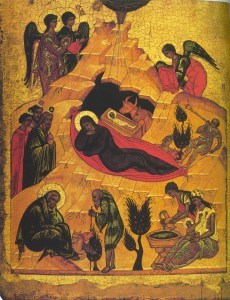 Advent began this past Sunday, November the 27th, which marks the beginning of the Church’s celebration of God’s taking up human flesh in Jesus Christ and becoming a man for us and for our salvation. In the spirit of this, here I wanted to share some of my favorite Advent related books you might enjoy reading (organized by author). Merry Christmas!
Advent began this past Sunday, November the 27th, which marks the beginning of the Church’s celebration of God’s taking up human flesh in Jesus Christ and becoming a man for us and for our salvation. In the spirit of this, here I wanted to share some of my favorite Advent related books you might enjoy reading (organized by author). Merry Christmas!
St. Athanasius
[Over the last two years I’ve read this short book during Christmas time and I have enjoyed it tremendously! I will be reading it again this year.]
Thomas F. Torrance
Incarnation: The Person and Life of Christ
Karl Barth
Church Dogmatics volume I/2 and IV/2
Robert Farrar Capon
The Mystery of Christ and Why We Don’t Get it
Wolfhart Pannenberg
C. Baxter Kruger
Across All Words: Jesus Inside Our Darkness
Jürgen Moltmann
The Coming of God: Christian Eschatology
C. S. Lewis
The Lion, the Witch, and the Wardrobe
Happy reading!
Like this article? Share it!

